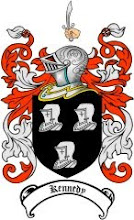
The Kennedy family is renown for their wealth, power, and good looks. Their beginnings of power can be traced back to
Joseph P. Kennedy Sr (1888-1969). Joseph Kennedy was an important businessman and political figure. He lead the Irish Catholic community, (which was discriminated against) was a leading member of the Democratic party, chairman of the U.S. Securities and Exchange Commission, leader of Maritime Commission, and was the US ambassador to Great Britian during the beginning of World War II. He married Rose Fitzgerald, the daughter of the Mayor of Boston. Jospeh Kennedy made a fortune from the real estate stock market, becoming one of the richest persons in the US at the time. He was also involved in film production. It is also rumored that he made a great deal of money from illegal bootlegging during Prohibition. Jospeh was a close friend to Roosevelt and Senator Joseph McCarthy, who fueled the fire in the Red Scare. Joseph dreamed of becoming president; to him, the position was the 'ultimate prize'. He was very careful about creating a perfect "Kennedy Family Public Image", saying "Image is Reality." From their childhoods, the Kennedy children had been put into a powerful position.
His children became very successful. JFK became president in 1960. Robert Kennedy was Attorney General. Edward Kennedy became a US Senator. Joseph P. Kennedy Jr. was a naval officer. Eunice Kennedy Shriver founded the Special Olympics. Jean Kennedy Smith was the US ambassador to Ireland.
Known for their good looks, intelligence, Roman Catholic background and power, at least one member of the Kennedy family has been in been in an elected office for 64 years.
The family, however, had been plagued by the "Kennedy Curse"- there have been a series of tragedies in the family. John F. Kennedy and Robert Kennedy were both assassinated, John in 1963 and Robert in 1968. JFK's older brother Patrick was killed in 1944 in World War II in a plane accident. JFK's son, John Jr. was killed in an airplane crash in 1999 along with his wife and sister in law. Edward Kennedy was also involved in a plane crash but survived. Ted Kennedy drove off a bridge in 1969, killing his passenger, Mary Jo Kopechne (Ted Kennedy pleaded guilty to leaving the scene of an accident, but it became a national scandal). Another incidents include a freak skiing accident, death by drug overdose, another car crash, cancer, two more deaths caused by plane crashes, and a stillborn birth.
Click here for more information and a list events of the Kennedy Curse.
 The Kennedy family attracted America because of their glamour and youth. Although JFK didn't accomplish too much in office and made a fool of himself during the Bay of Pigs, he and his family are still remembered favorably-because of their youth and power.
The Kennedy family attracted America because of their glamour and youth. Although JFK didn't accomplish too much in office and made a fool of himself during the Bay of Pigs, he and his family are still remembered favorably-because of their youth and power.




